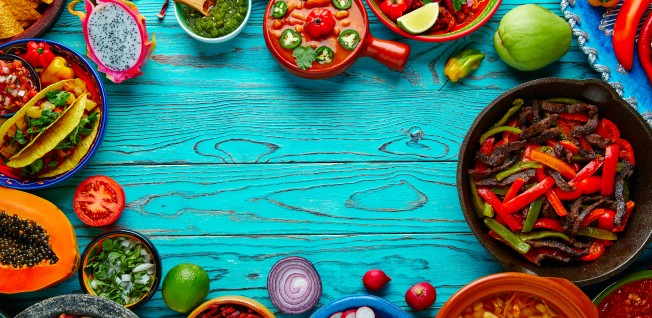How We Eat

Where and how often did you shop for groceries at home?
Bobbi: KC and I typically shop once or twice a week in the grocery stores. During growing season, we pick up weekly produce baskets from a local organic farm. There’s also a Saturday market nearby where we buy all of our meat and eggs directly from the farmers. Although we emphasize local and unprocessed foods, neither of us likes to cook, and we still eat more pasta with sauce-from-a-jar than we should.
Hope: We usually did one big shopping on the weekends, which was one of our favorite outings and we joked that it was our “date.” Since we’re kinda particular about the food we buy, this usually meant trips to several different stores – Trader Joe’s, Whole Foods, Sunflower…and maybe a normal ol’ grocery. In the growing season we would hit the Saturday market for produce as well as fresh eggs and we’d get as much good stuff from our own garden and trees as our horticultural success that year dictated (usually at least tomatoes, zucchini, peaches, and more herbs than we knew what to do with). One or the other of us would pick up fill-in items during the week on the way home from work.
How has it changed abroad?
Bobbi: We shop almost daily now, for two reasons: First, we’ve decided to (almost!) always walk to the grocery, so we can’t carry much. Second, produce goes bad faster than in the US, presumably because they wait to pick until it’s actually ripe… As a result, we need to eat everything we buy within a day or two.
One thing I really miss is access to organic and farm-fresh foods. We had romantic notions of shopping in old-world style markets, and it was a disappointment to discover that those markets are selling the same agri-industry vegetables as everyone else. As with many things about this lifestyle, though, we’re slowly getting better at finding what we want. Just as at home, we must endeavor to find wholesome food, and I now know it’s not likely to be found at the touristy Mercato Centrale in downtown Florence. I eventually found the monthly organic market in Istanbul by searching English-language blogs, and a side benefit of living in tiny Haenertsburg, South Africa, has been meeting the owners of Wegraakbosch organic farm and dairy, who deliver a whole box of produce and eggs weekly for $7.
Hope: I’m pretty much with Bobbi on this one, although I’d add a third reason we shopped almost daily – it was fun! (at least at first; after a few months of it the novelty wore off). Since we lived up several flights of stairs and walked everywhere, there was really no way to overshop. In addition, the package sizes are much smaller, so you have to shop to replenish your juice or milk more often in any case. It was also difficult to “source” ingredients in Italy if you wanted anything other than Italian, so that would add trips to various places across town to the one place that sold fresh ginger, Japanese ingredients, etc. On the other hand, if it was pesto or pasta you were craving, you had an endless variety at your disposal!
How do you choose places to eat out? Do you eat out more or less than you did at home?
Bobbi: KC and I are not foodies; while we love to stumble upon a great restaurant, we go out more to avoid cooking than to seek out great eating experiences. As a result, we often have mediocre meals because we’re starving by the time we decide to go out and settle for the first place we see. But if we plan ahead, I find we have our best meals when I do a little research on TripAdvisor or travel blogs and forums.
We probably eat out less while traveling than we did at home. I suspect this is because at home, eating out is a large part of socializing with friends. We may be in the minority in that more food-inquisitive travelers (like Hope!) would be taste-testing their way around the world.
Hope: We both love eating out, but we didn’t eat out that often at home because I also love to cook. We’d usually eat out about once a week – special things that are easier to get at a restaurant than make at home – sushi, Thai, Vietnamese, etc. Since we had a semi-gourmet kitchen and everything we needed, I took pleasure in cooking dinner most nights, with Steve happy to “sous chef.” As our kitchen in Italy was a less-fun place in which to try and cook (e.g., if you turn on the oven and anything else at the same time you’d blow a fuse), we tended to eat out more (or at least eat take-out more).
We found what became our favorite places through a variety of means – getting recommendations, reading reviews online, and mostly, just poking our noses into the local places and trying the ones that seemed good – if we were right, they became part of our “go to” list. Unfortunately for us, though, restaurants in Italy don’t get up and running until 8:00 p.m. and later, and as we never really got used to eating at that time, our “eating out” dinners mostly ended up being take-away, in the form of pizzas (often), kebabs (ubiquitous European fast-food), or mediocre Chinese (more often than I care to admit). When all else failed, there was a wonderful rosticceria right on the ground floor of our apartment building (an Italian takeaway place that cooks traditional Italian food). Usually the yummy Italian or special “foreign” food restaurants were relegated to weekend lunch.
How did your cooking habits change?
Bobbi: One of the funniest challenges has been adjusting to short-term rental apartments where, every 4 – 12 weeks, we move into a new kitchen stocked with about 6 utensils and no spices whatsoever. I am grateful for the Egyptian Bazaar (aka The Spice Market) in Istanbul where I met Teslim at the Airfoglu spice shop who vacuum-sealed his special salad dressing, meatball, chicken, and curry spice mixes for me to stuff into my backpack.
One positive change has come about because we imagined that the rest of the world eats better than Americans and have kept their family cooking traditions intact. Given the amount of junk and processed foods available in large grocery stores, I no longer believe this to be entirely true; however, I have noticed that our assumptions inspired us to start cooking almost entirely from scratch, and even though our lazy fall-back is still a bag of pasta, we almost always top it with roasted veggies instead of a jar of pasta sauce.
Even being culinarily-challenged as we are, each country has nonetheless inspired something that we will take home: In Italy, KC ate so much handmade pasta from the homemade-pastashop down the street that I agreed we might want a pasta machine when we get home. (I don’t know what to tell him about the homemade smoked pecorino cheese sauce, though…) In Turkey, I bought a Turkish cookbook and we’ve been using Teslim’s spices to master some truly mouthwatering recipes. In Botswana and South Africa, the braai (BBQ) rules supreme and we’re learning the ropes of cooking over wood (briquettes? South Africans put them in the same category as a cute chihuahua in a pink sweater); our specialty is a lekker loaf of beer bread baked in the coals.
Hope: I tended to cook much less in Italy than I did at home, mostly because it felt more like a chore than fun. I did spend some time trying to “recreate” comfort foods (anything Mexican, New Mexican, or Tex Mex) as well as bake “American” goodies for some nice folks in the neighborhood and my Italian language school classmates (LOTS of zucchini bread!). Some things that were a staple back home (Sunday bbq’s with giant-sized steaks) just weren’t doable at all.
I think one positive bring-back is the idea of not over-buying or over-cooking. At home it seems like we’re always cooking for an army and ending up eating leftovers for days (or wasting food). Since everything here comes in much smaller packages, we tended to just cook what we ate for that meal.
I was surprised, much like Bobbi, at the amount of “junk” and inorganic food here. This is actually a large change since our fist stay in Italy in 2006 where I remember specifically noting that there was very little processed food (and no “specialty” processed food – diet, gluten-free, etc.) to be found. I also naively assumed the produce at the beautiful outdoor markets was organic, though it became clear it wasn’t when I found the one booth actually labeled “organic” (and with prices to match).
Okay, Bobbi, you say you’re not a foodie and then talk about cooking with exotic spices and baking BREAD – over coals no less! I officially dub you a foodie!!!











